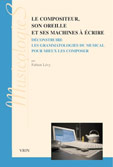The composer, his ears and his tools: Deconstructing musical grammatologies in order that we might better recompose them
Prefaces by Hugues Dufourt and Jean-Claude Risset
Librairie Philosophique J. Vrin, collection «MusicologieS»
25,- €, ISBN 978-2-7116-2511-6, 288 S., 2014
'Contemporary music' is a rather generic term that is often the object of opprobrium for the overly cerebral connotation (and by association, rejection of lower-order, sensory experience) that is attached to it. It would nonetheless be reckless to dismiss a movement of such diversity which has, after all, given rise to an extraordinary corpus of works. On one hand, the term describes the musical manifestation of post-war structuralism, a transdisciplinary movement, which revered, above all else, science and the intellect, and structures which were derived thereof. On the other hand, it is little more than the next step in the long evolution of Western musical culture, which since the time of Pythagoras has been based upon Logos, structure and abstraction.
Across numerous disciplines, the end of the 1960's was marked by a broad tendency to interrogate notions of structure and certain principles that were intrinsically connected to Western modernity. Furthermore, a concurrent willingness to integrate notions derived from extra-European musical traditions, musique concrète and electronic music, and the Cageian revolution, led to a diversification of all aspects of musical performance-practise and thought. New musical forms emerged: free jazz, minimalism, pattern-music, sound-installation, music with live-electronics, spectral music, noise-based music, free improvisation, new-simplicity, new complexity, etc. These, along with other forms, might all be described as 'post-modern music'.
Of course musical strategies are inherently brittle and fragile; how does musical thought renew itself without recourse to modernist principles (in particular, with regard to conventions of notation and representation)? How might we challenge the vestiges of modernity whilst avoiding the pitfalls of an anti-elitist approach, one which advocates the relativisation of all parameters and a blanket rejection of hierarchies? How might we construct a music upon sensory phenomena without resorting to parody and citation, or submitting to the tastes of those who surround us? How do we reject euro-centrism whilst avoiding garbled pan-globalism? How might we contest logocentrism without becoming misologues?
The present work is an attempt to deconstruct the mechanisms of modernity which operate within Western music, in order to a.) better identify the potential for approaches to composition which reject a fetishisation of the combination of signs, and b.) propose a renewed approach to listening, the need for which stems from the 'normalisation' of listening habits.
What do we risk losing, and stand to gain, by undertaking analytical speculation in composition? Does the listener perceive (or indeed should he/she perceive) the 'intentions' of the composer? What is the relationship between audible form and structure on paper? Is complexity a condition of innovation/novelty? What forms does such complexity take? Should music be consonant? If so, why, and in what way?
This book is intended for composers, musicians, and others who are concerned with the problems of music writing and composition, but also for those who wish to gain a greater insight into how music, with its own lexicon, is able to pose questions, questions which have analogues in the other disciplines of the intellect.

